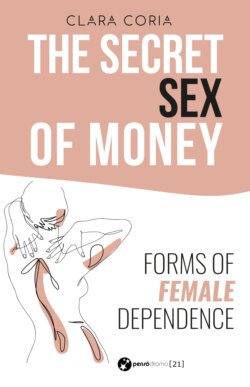Читать книгу The Secret Sex of Money - Clara Coria - Страница 10
На сайте Литреса книга снята с продажи.
The contents
ОглавлениеThis book is aimed at professionals in social sciences and men and women interested in the subject matter.
It covers topics related to women and includes a chapter addressing the dilemma concerning men’s relationship with money. Other chapters, such as those referring to psychotherapeutic treatments, are dealt with in detail for readers interested in a psychological approach.
The topics concerning women centre on the situation of economic dependence and its varied expressions. This dependence is set within a broader and more complex problem, namely that of economic marginalization and the significance money acquires for women. Cultural changes that have given women access to education and money have lessened neither this marginalization nor the attitudes of subordination by men.
This book develops the hypothesis of an internal, unconscious conflict between the desire to attain the ideal woman – responding to the maternal image and all the characteristics that patriarchy attributes to it – and the woman’s need to interact effectively and autonomously in today’s world, where they enjoy greater access to the public realm and to money.
I go on to describe the gruelling and silent struggle that women unconsciously endure and from which they emerge with differing outcomes.
This hypothesis is complemented by an analysis of certain phantasms,7 chiefly the phantasm of prostitution, which attempts to explain many of the difficulties that women encounter in their daily dealings with money.
The section given over to men outlines their ensnarement in the “money-making” trap. Associated with sexual prowess, money becomes almost an indicator of masculinity. It analyzes a particular model of sexual power based on quantity – which is linked to consumerist demands of capitalism8 – and how the expression “time is money” is representative of a trap for men that promotes the omnipotent illusion of inexhaustibility. It is an illusion that seeks to counter the anxiety of castration, understood in its broadest sense as finitude and death.
This first book on the subject attempts to explain and convey the following ideas:
1 Money is a taboo subject in our culture. It is omnipresent but is omitted in reflections. Beyond the economic context, it is shrouded by complex interpersonal contracts. Strikingly, though money interests everyone, it has no room for debate without the usual pressures.
2 Money is sexually differentiated in our culture. In widely diverging ways, for men money denotes potency and virility, verging on an indicator of male sexual identity.
3 Patriarchal ideology endorses this sexual differentiation, thus perpetuating women’s economic subordination.
4 Sexual differentiation is not innocuous to men either: money is intimately associated with “virility” while its absence questions a man’s sexual identity.
5 It is possible to contribute to the transformation of these conditioning factors through consciousness raising. For women, awareness of economic marginalization and the lack of autonomy. For men, awareness of the association of money and virility. In this respect, consciousness-raising groups are exceptionally beneficial to this end.
